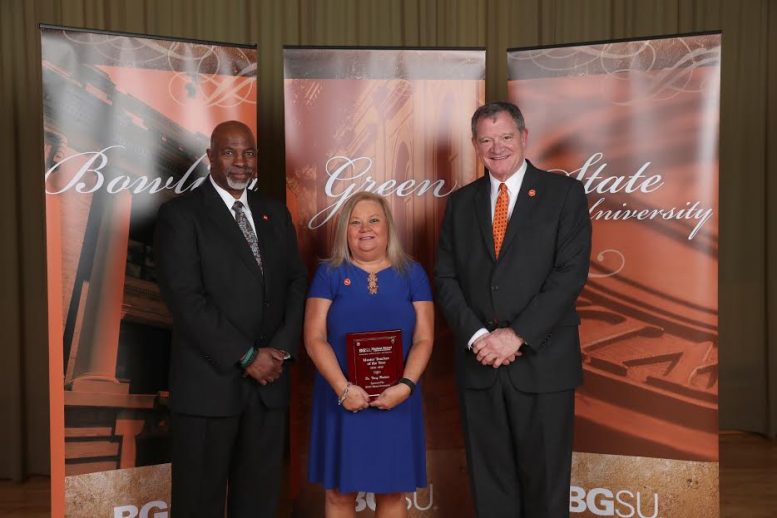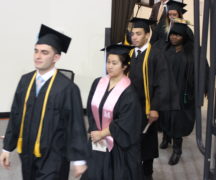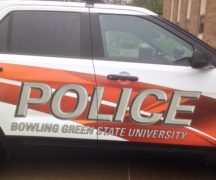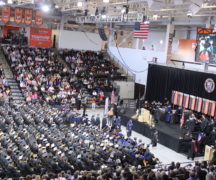From BGSU OFFICE OF MARKETING & COMMUNICATIONS
Three college of Arts and Sciences faculty — Terry Rentner, Mikhail Zamkov, and David Jackson — have received awards for excellence.
Terry Rentner honored by Student Alumni Ambassadors
Dr. Terry Rentner believes in engaging students both inside and outside the classroom at Bowling Green State University. In fact, she surmises that If students are not engaged, then lifelong learning cannot take place.
For her dedication to her students, Rentner, a professor of journalism and public relations in the School of Media and Communication , has been named the 2019 Master Teacher by the Student Alumni Ambassadors. The award includes a $1,000 cash prize.
The prestigious award allows both graduate and undergraduate students to participate by nominating one of the University’s professors. The Master Teacher Award is the only student-driven and student-selected award given to a faculty member at BGSU. A time-honored tradition beginning in 1982, the Master Teacher award is respected by faculty as one of the most coveted honors and recognitions the University.
The process for the award typically begins in the spring semester. A nomination callout is presented to BGSU students, giving them the opportunity to nominate faculty members deserving of this honor at the Bowling Green campus and at BGSU Firelands.
“My teaching philosophy can best be described as an interactive, engaging approach that equips students with what they need to know and what they want to know,” said Rentner, who came to BGSU as a lecturer/instructor in 1987. “I do this by providing a foundation for leadership, cooperation, intellect, mutual respect and personal growth. I also encourage students to challenge themselves to perform to their highest abilities.”
Rentner has been a professor in the Department of Journalism and Public Relations since 2012. She was the director of the School of Media and Communication at the University from 2008 to 2013. Prior to that, she chaired the Department of Journalism from 2004 to 2008. She was named associate professor in 2002 after having been an assistant professor at BGSU from 1996 to 2002.
Her research interests include health communication, social marketing, sports public relations and public relations pedagogy. She incorporates those facets into every face-to-face and online class she teaches, creating a natural fit for life-long learning and engagement.
“As an example, drawing from my research and the campaigns I’ve implemented on this campus, students in my capstone public relations course this semester are developing alcohol social norms campaigns,” Rentner said. “The title of my new co-edited scholarly text, ‘You Make the Call: Case Studies in Sport Communication,’ purposely emphasizes the word ‘you’ in the title to facilitate class discussions on current events in sports, engage students in critical thinking and written assignments, and foster a sense of ownership in the student’s learning process.
Activities in her courses are not exam-based but instead utilize theoretical and applied concepts that help students creatively learn through high-impact activities such as participating in community service-learning projects, developing creative public relations materials and participating in the annual NFL Broadcast Boot Camp, which she helped facilitate in bringing to BGSU.
“Students are given the latitude to creatively apply theory, conduct research and execute industry best practices to solve real-world issues,” Rentner said.
She has twice been a top five finalist for the Master Teacher Award, served for 20 years as adviser to the Public Relations Student Society of America (PRSSA), and is co-founder of the Richard Maxwell project. Rentner is a health communication scholar and developer of social norms programming at the University. Her work as a principal or co-investigator in college student health has led to more than 20 state and federal grants totaling $1.5 million. Her primary research focuses on alcohol, tobacco and prescription drug misuse, while her secondary research explores issue in public relations teaching. She has received state and national awards for her health communication campaigns, including one from the U.S. Department of Education that named the BGSU’s peer-focused alcohol program as one of eight top programs in the country.
In the classroom, Rentner experiences profound satisfaction when students engage in respectful class discussions, connect course concepts to their lives and future livelihood, and feel empowered by their own learning.
“It is the appreciative phone call, email, card or letter that I receive from students who graduated three days ago or 30 years ago that gives me a tremendous sense of personal fulfillment,” she said. “It is the pride I feel when students say I touched their lives in some meaningful way, whether through the skills they learned, the internship or job I helped them get, the courage to tackle graduate school or the mentorship they say I provided throughout their college days.”
Watching her former students flourish in their careers and seeing them contribute to their communities is tremendously satisfying, Rentner said.
For her, teaching doesn’t stop in the classroom.
“For me, teaching must continue outside of the classroom through advising, mentoring, internship opportunities, resume critiquing, networking opportunities and serving as adviser to student professional organizations,” said Rentner, has presented more than 50 conference papers and published refereed journal articles in myriad high-level publications. “My teaching philosophy goes beyond the classroom itself to incorporate the overall wellness of the student. I believe that students can’t succeed if they aren’t mentally, emotionally, physically and socially healthy, which is why my areas of research intersect with my teaching.”
Rentner said the responsibility to create an environment that fosters respect for others’ opinions while exploring new and novel ideas to individuals falls on her shoulders.
“This is accomplished by creating a highly interactive environment that begins the first time students step into my classroom or my office for academic and career advising and continues through graduation and beyond.,” she said.
In her opinion, a “Master Teacher” has to be able to recognize that each student is on a unique educational journey, and the educator’s role is to enrich that journey.
“A Master Teacher embraces equity, diversity and inclusion in the classroom and integrates those values into course materials so students become champions of change in an increasingly diverse world,” Rentner said. “A Master Teacher is engaging, supportive, kind, approachable and available. They are also knowledgeable, challenging, respectful and reflective. Master Teachers are open to diverse ideas and opinions and serve as role models to students and exemplars to colleagues.
“Master Teachers always seek to be more effective in the classroom. Those educators still wake up after 30 years with the same enthusiasm to teach as they had on the first day they walked into a classroom.”
Rentner came to BGSU after working in TV, radio and public relations. She received her Ph.D. in sociology from BGSU in 1995 after having earner a Master of Arts in mass communication in 1988 and a Bachelor of Science in journalism in 1982, both from the University. She has served as a PR consultant since 1987.
Mikhail Zamkov receives support for work with nanomaterials
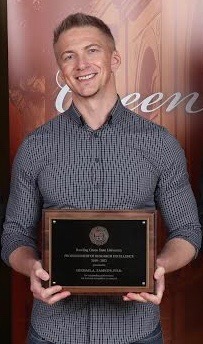
The University has chosen to recognize Zamkov and provide additional support for his work by naming him a 2019 Professor of Research Excellence. The title is conferred upon members of the faculty already holding the rank of professor and who have established outstanding national and international recognition through research and publication or creative/artistic achievement in their disciplines. The title is for a period of three years, with an annual stipend of $5,000 — a $3,000 salary stipend and $2,000 for professional development.
Dr. Mikhail Zamkov, a Bowling Green State University professor of physics and astronomy is among an elite group of international researchers working in the field of nanocrystals, extremely minute particles that hold great potential for a wide variety of applications.
The University has chosen to recognize Zamkov and provide additional support for his work by naming him a 2019 Professor of Research Excellence. The title is conferred upon members of the faculty already holding the rank of professor and who have established outstanding national and international recognition through research and publication or creative/artistic achievement in their disciplines. The title is for a period of three years, with an annual stipend of $5,000 — a $3,000 salary stipend and $2,000 for professional development.
Zamkov’s lab focuses on synthesis and characterization of nanocrystals. His highly interdisciplinary research uses concepts and techniques from biology, chemistry, physics and engineering to achieve its goals. He has been referred to as “one of the world leaders in photophysics of optically active nanocrystals,” and his work has been praised by external supporters for its elegance, innovation and high quality.
He is extraordinarily productive, averaging five refereed journal articles a year in top-tier journals, along with a similar number of published conference proceedings and abstracts.
“In the rapidly moving field of nanomaterials, work that is not groundbreaking is quickly superseded and forgotten,” said his nominator Dr. John Laird, chair of the physics and astronomy department. By contrast, Zamkov’s work has had an enormous impact, especially for a mid-career scientist, as demonstrated by the high number of citations of his work and his high rating by the index used to indicate the overall value of the contribution of one’s research over time.
Zamkov’s publication on energy transfer in semiconductor nanocrystals in Science, a top journal in scientific research, was one of the most-cited articles on chemistry, in the top 1 percent, for a year. His research includes more than 75 peer-reviewed journals articles.
He has been granted one patent and has two more pending, “another indicator of the innovative nature of his work,” Laird said.
He also has an outstanding record of obtaining external funding, garnering more than $2.4 million and with four active grants, three from the National Science Foundation and one from the U.S. Department of Energy. These demonstrate the breadth and innovative nature of his work, Laird said. And in today’s era of reduced federal funding and increased competition, his success is even more remarkable, said Dr. Raymond Craig, dean of the College of Arts and Sciences https://www.bgsu.edu/arts-and-sciences.html.
“Clearly, there is great synergy here,” Craig said. “Extraordinary publications lead to extraordinary grant support leading to more extraordinary publications.”
Zamkov is held in high regard by his fellow scientists, Laird said. He has given 11 invited presentations at conferences in the last seven years, including national meetings of the American Chemical Society and international meetings of the Materials Research Society. Twice he has given talks at the prestigious Gordon Research Conferences, international conferences limited to select leading professionals in a given field. In addition, he has been asked to serve on seven grant approval review panels by the National Science Foundation and has served every year since 2010 on Department of Energy review panels for the prestigious CAREER grants.
He has served his profession as well, being chosen as co-organizer of two American Chemical Society symposia and a regional Ohio Photochemical Society meeting; he was the organizer of a regional American Physical Society meeting that was highly praised for its scientific quality.
He also paves the way for the next generation of photochemical scientists, taking on a heavy load of dissertation direction from his research lab team, and successfully bringing his doctoral students to completion of their degrees. His teaching and mentoring have been recognized with a Research Exemplar Award from Washington University.
“He sets a remarkable standard for other faculty in his department and in the Center for Photochemical Sciences https://www.bgsu.edu/arts-and-sciences/center-for-photochemical-sciences/phd-program.html,” Craig wrote.
Zamkov came to BGSU in 2007 after postdoctoral work at Kansas State University, from which he received his Ph.D. in physical chemistry, and the University of Illinois at Urbana-Champaign. He received his bachelor’s degree in theoretical condensed matter physics from Krasnoyarsk University in Russia.
Wide range of service earns David Jackson new title
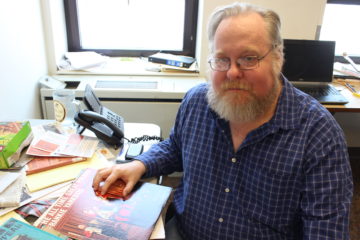
Dr. David Jackson wears many hats: political science professor, Bowling Green State University Faculty Association president, political expert. Through these roles, and others, Jackson has performed a wide range of service to the University, his profession and the community. As a result, he was granted a Professorship of Service Excellence at the annual Faculty Excellence Awards April 16.
The title is conferred upon members of the faculty who have established national and international recognition through professional service, public service and/or external engagement through their work at the University. The title is awarded for three years and includes an annual stipend of $5,000, $2,000 of which will go toward professional development.
In his nomination of Jackson for this award, Dr. Neal Jesse, political science professor, highlighted Jackson’s service to BGSU as president of the Faculty Association and his engagement with national media.
“Dr. Jackson provides an invaluable service to BGSU as president of the BGSU-FA. More than that, though, his position as president places him at the head of a large chapter of a national academic union, the American Association of University Professors,” Jesse wrote. “Thus, through two contracts, Dr. Jackson has been central to not only the cooperative relationship between faculty and administration on campus, but he has also engaged with the national organization and earned national recognition for his efforts.”
Jackson’s unique perspectives on U.S. politics have also earned him national and international recognition. His service has helped frame the emerging role of celebrity on political thought through a lens of academic research and civic responsibility.
“His work on celebrities and politics over the last decade and a half has led him to make multiple media appearances and contributions,” Jesse wrote, adding that this engagement includes American, British and Canadian media.
Highlights of these contributions include an op-ed in the Cleveland Plain Dealer, a more than 2,000-word article on his research in The Atlantic and appearances on the CBC, the BBC, the Australian Broadcasting Corporation and Iranian TV.
Dr. John Fischer, senior vice provost for Academic Affairs, expanded on Jackson’s service to the public, highlighting his “research-based engagement in the political sphere as an informed contributor to understanding important aspects of politics in the United States today.
“David Jackson has demonstrated well the ability to take his own research and make contributions to the public sphere; his work on celebrity was timely and his public speaking and general press citations have been quite relevant in recent political campaigns.”
In addition to these areas of service, Jackson is also known for his interest in Poland, including the Polish diaspora in the United States. He has written about the role of music in the creation and maintenance of the Polish-American identity and is host of the Sunday Morning Polka Show on WXUT, 88.3 FM. This interest led to a Fulbright Fellowship to teach for a semester at the University of Lodz in Poland. While there he taught U.S. Government, Media and Politics, and Canadian Government. He also studied the relationship between entertainment media use and political beliefs among young people. He wrote about the experience in his 2009 book, “Classrooms and Barrooms: An American in Poland,” published by Hamilton Books.
Jackson came to BGSU in 1997 as an adjunct instructor, advancing to professor in 2015.

